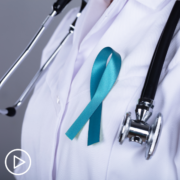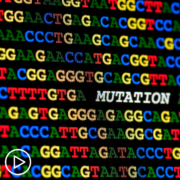Hereditary Ovarian Cancer: What’s Your Risk?
Hereditary Ovarian Cancer: What’s Your Risk? from Patient Empowerment Network on Vimeo.
What should patients know about ovarian cancer and hereditary risk? Expert Dr. Ebony Hoskins explains the incidence rate of hereditary ovarian cancer and shares advice about when it’s important to ensure you get genetic testing.
Dr. Hoskins is a board-certified gynecologic oncologist at MedStar Washington Hospital Center and assistant professor of Clinical Obstetrics and Gynecology at Georgetown University Medical Center. Hoskins sees women for gynecological malignancies, which include the treatment of endometrial, ovarian, vulva, vaginal and cervical cancers.
[ACT]IVATION TIP
“…if you know someone who has ovarian cancer or if you’re affected yourself, make sure you have gotten genetics testing standard of care.”
See More from [ACT]IVATED Ovarian Cancer
Related Resources:

Ovarian Cancer and Clinical Trial Participation: What Patients Should Know |

|

|
Transcript:
Mikki:
Dr. Hoskins, can ovarian cancer be hereditary? Should patients suggest that their family members undergo genetic testing?
Dr. Ebony Hoskins:
So, yes, ovarian cancer can be hereditary. Approximately 10 to 15 percent are associated with an increased risk with family history. It is now recommended that any patient with ovarian cancer get genetics testing period, even if there’s no family history that they should be offered genetics testing. I always recommend that an affected person, when I say affected person, I mean the person that have the cancer diagnosis get the genetics testing first. So sometimes I see patients where they’re…have several family members with, say, breast cancer, which could be indicative of a breast like a BRCA mutation, which is associated with an ovarian cancer. And come to find out they’ve had genetics testing, but they don’t have the gene for ovarian cancer. So again, it’s important that the affected person, meaning the person that have the cancer, get genetics testing. My activation tip for this is if you know someone who has ovarian cancer or if you’re affected yourself, make sure you have gotten genetics testing standard of care.
Share Your Feedback:
Create your own user feedback survey










